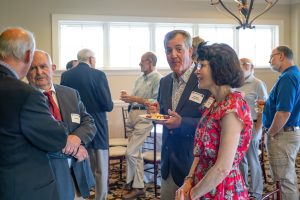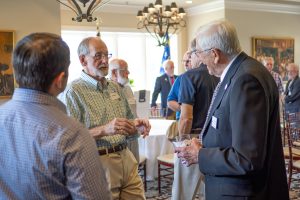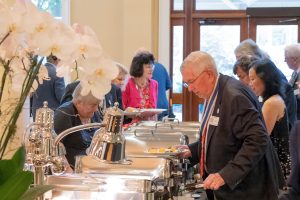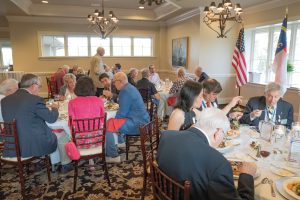General Francis Nash Chapter Meeting June 27
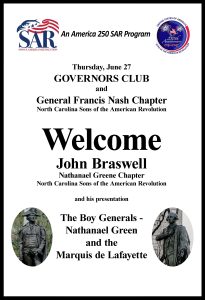 The General Francis Nash Chapter met Thursday, June 27, in conjuction with an America 250 presentation by Nathanael Greene Chapter Compatriot John Braswell at Governers Club in Chapel Hill.
The General Francis Nash Chapter met Thursday, June 27, in conjuction with an America 250 presentation by Nathanael Greene Chapter Compatriot John Braswell at Governers Club in Chapel Hill.
The event began with a “meet and greet,” giving members more time than usually available before meetings to socialize and welcome new and prospective members.
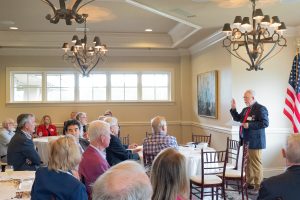
A Chapter meeting followed, led by Chapter President Al Segars. The Agenda included the 2024 Congress, a reminder in this election year that SAR is politically neutral, news of Chapter “Minuteman Society” members, upcoming Chapter elections, upcoming meetings, and awards and recognition. GFN members, prospects, and spouses were joined by NC SAR President Steve Van Pelt and NC SAR Treasurer Sam Powell and his wife.
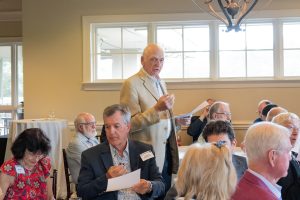
Chapter members already contributing the full $1,000 for the Minuteman Society are Guy Guidry, Owen Gwyn, Lowell Hoffman, Ralph Nelson, and James Stanley. Those paying in annual installments include Denny Colvin and Al Segars. Seven is a considerable proportion of the GFN membership.
The next Chapter activity will be a tour of the Guilford Courthouse Battleground on September 14.
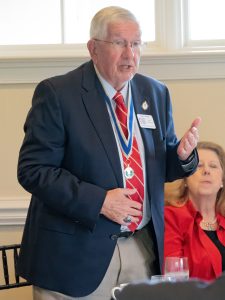
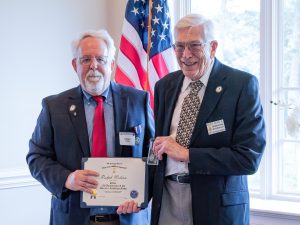
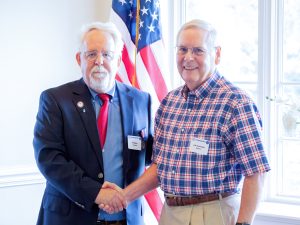
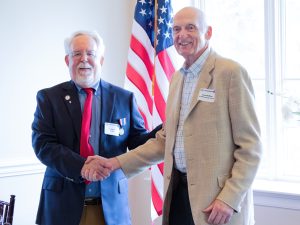
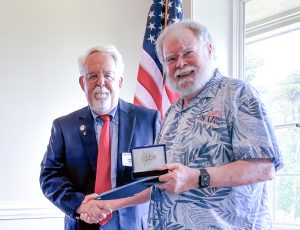
Photo by Larry Lisle
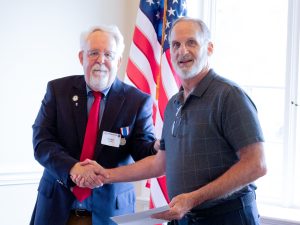
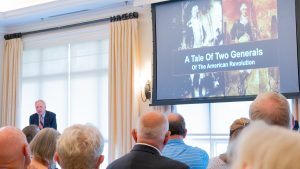
The meeting then adjourned for some Champagne, and to move to the Governors Club Ballroom for John Braswell’s presentation. John described two young and somewhat improbable Generals, Nathanael Greene, a Rhode Island Quaker who studied military tactics and was suspended by the Church for it, and another a French Aristocrat, the Marquis de Lafayette, who was forbidden by the King of France to assist American Patriots. Both Generals played key parts in the defeat of General Cornwallis, and the winning of the war; Greene forcing Cornwallis to abandon his Southern Campaign [after horrendous Patriot defeats under General Horatio Gates]; Lafayette and his troops part of the force surrounding Cornwallis at Yorktown, VA, leaving him no alternative but surrender; and Greene again, immediately geographically dispersing the captured Redcoats, leaving a British naval counterattack futile and aborted.
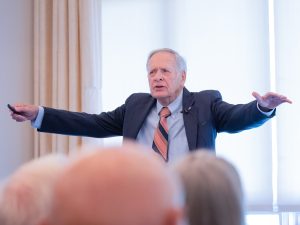
The two had very different lives after the Revolution, too. Greene was presented with Mulberry Grove, a large plantation in Georgia in 1782, but lived only until 1784. His widow (and her future second husband), after a chance meeting with Eli Whitney, was key to the development of the Cotton Gin, which was developed at Mulberry Grove; its creation made southern cotton with slave labor extremely profitable, and somewhat led to the Civil War.
 Lafayette returned to France and advocated for rights patterned after Jefferson’s writings. In 1792, he was arrested and spent five years in prison, ultimately released due to Napoleon’s efforts. In 1824, he returned to the United States, where he was lauded as a hero, with places across the country named for him. When he died in 1834, he was buried in Paris, but in soil imported from Bunker Hill, and under an American flag.
Lafayette returned to France and advocated for rights patterned after Jefferson’s writings. In 1792, he was arrested and spent five years in prison, ultimately released due to Napoleon’s efforts. In 1824, he returned to the United States, where he was lauded as a hero, with places across the country named for him. When he died in 1834, he was buried in Paris, but in soil imported from Bunker Hill, and under an American flag.
After John Braswell’s presentation, the Chapter enjoyed a buffet dinner at Governors Club.
